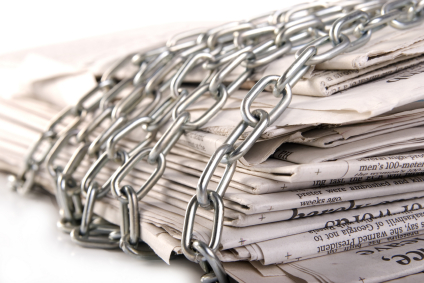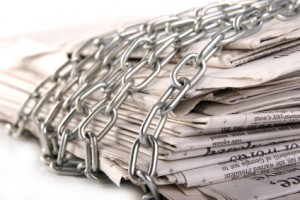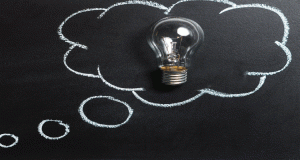“I would rather have a completely free Press with all the dangers involved in the wrong of that freedom than a suppressed or a regulated Press” said Pandit Nehru in 1950 when “Indian Constitution” was born. The Pioneer of “Indian Constitution” Dr. Baba Saheb Ambedbar looked up to press and its freedom with high esteem. During the freedom struggle, the press played a major role of mass awareness and many of the national leaders used press as a strong instrument to inculcate oneness and brotherhood in Indian minds.
The Supreme Court of India emphasized the role of press during the highly controversial Ramesh Theppar case in 1950. It stated “Without free political discussions, no public, education, so essential for the proper functioning of the process of popular government is possible. Raja Ram Mohan Roay, Lokmanya Tilak and even Mahatma Gandhi generated mass awareness of their agendas through the medium of Press. Press is not a modern phenomenon in India; it was in 1780 that an English Gentleman started the 1st newspaper from Bengal, called as the “Bengal Gazette”. James Hickey who pioneered the so called “Press Act” in India was later imprisoned and the printing press was seized. It was this very event when people realized the significance of “Freedom of Press”. The Indian Constitution is highly inspired by that of the United States of America and the United Kingdom.
What are the primary objectives of the press? The changed style of functioning of Press back during the independence days and at present is highly debatable but with what aims did the press strengthen its roots in India? Media has always had the capacity is perform the impossible. It has the courage to expose the dark secrets. It is backed up by the government and thus fearlessly challenges the authority. Media is called the fourth pillar due to important role of media in shaping public opinion. Ensure equal and balanced authorities between the three branches (pillars) of government, namely: Executive (apply the law), Legislative (write the law), Judicial (interpret the law). Media can be seen as an equally important pillar to this balance because its role is to ring the alarm bells in cases of abuse of power. Free Press has been considered the 4th pillar of democracy. This is because free press can keep a check on the legislative, executive as well as judiciary by influencing public opinion and can also help the legislative to remain connected to the people for whom it is forming the ‘LAWS’. Malcolm X said “media is the most powerful entity on earth. They have the power to make innocent guilty and guilty innocent, and that is power because the control the minds of the masses. Today, media is considered the 4th pillar of the state all over the world, 1st and foremost British Member of Parliament Lord Macaulay had given this status to media. Media is considered more important as it plays a vital role as an informative bridge between government and masses. In absence of media masses cannot know about the bills and acts passed in the house and their consequences on the society.
It is an integral bridge between ‘the people’ and the government. Possession of right information is the foundation stone of anything you can think of. Be it War, Business, Sport…. name anything. If you have the right information, only then you can think of proceeding forward. And that is the primary reason why Press is so important. We know what’s happening in the next neighborhood of the city if it’s not in the Newspaper or Television! Media plays a vital role in shaping a healthy democracy. It’s the backbone of democracy. It makes us aware of various social, political and economic activities happening around the world. It’s like a mirror showing the bare truth and harsh realities of life. Of the people, by the people, for the people is what we understand by democracy. We have the fourth estate of democracy which is media, the informative one.
Journalism as we know is about collecting, selecting information, writing, editing, photographing, broadcasting/publishing and owning a news organization. And therefore a journalist is known as the watchdog of the society. Peeping back into history we see that journalism started way back in Rome. It was Thomas Carlyle a Scottish satirical writer in the 17th century who initiated the phrase “The Fourth Estate” to journalism. We see that media is a very powerful pillar of our country, as it was only because of the power that Indira Gandhi had to censor media during the emergency in 1975. This proved that “pen is mightier than the sword”, and this is all what is journalism about. The function of media is not only to entertain but also to inform and educate. Journalism tries to set an agenda for the public which can shake the grounds of the policy makers and can bring a tsunami in calm water. It has to its shoulders three responsibilities which are social, legal and professional and so it caters to all. Media is powerful enough to shake the base of the other three pillars.
Unlike a Communist or Feudal system, in democracy, the media, apart from informing the public of the latest happenings in the country, has the added responsibility of being independent of the state in obtaining the correct data, and also being impartial while presenting it in public. The term “media” doesn’t end at the daily newsreaders and journalists, it expands to prime time television, movies, magazines, etc. The media has significantly helped the cause of woman empowerment, caste and religion differences, communal harmony, freedom of expression, right to information, etc. How in some cases it provided justice to the common man and fought the war on behalf of the man on the street against the almighty bureaucrats and politicians; and how in certain cases, perhaps in a bid to flaunt its apparent secularity or in lieu of some vested interests, it distorted facts, sensationalized news, created mass-hysteria, thus spreading hatred, and straining the communal fabric of the country. It exposes the loopholes in the governing, helps in adapting a citizen friendly government.
Press is the mouth piece of the masses. It is in questioning and raising your opinions that press puts major impetus on. Press does what every sovereign citizen of this country should be doing but does not have the time and money to do so. It provides a food for thought to its readers and pushes them to form opinions.
The Press must religious work to protect public interests and safeguard the rights of the citizens. Since the press has the power to influence millions of minds, it is a highly responsible task. Today Corporatization has not spared the Press as well. “Press is no more influenced by corporate it has become corporate”.
The question arises is, How independent is our press? Freedom of speech, how often do we think about it? Do we question whether what we read in the newspapers is factual or just a product of Media Net? ALMOST all the newspapers and broadcasts are owned by political parties and corporate. They use and abuse the power of Press for their selfish interests. Do we question the credibility and authority of institutions that monitor press such as “All India Press Council” or “Press Commission of India”?
The American Commission on Freedom of Press states that “If people are to govern themselves, their hopes of doing so wisely lies in the collective wisdom, derived from the fullest possible information, and in their fair presentation of differing opinions”. In the United States, the Freedom of Press is practiced keeping in mind the 1st Amendment of the Constitution. In India, Press has the freedom to inform and aware masses according to the Act, 19(1) of the Constitution. Freedom of Speech, how well are these rights practiced? Is political pressure and corporate world narrowing the freedom of Press? Is the Indian media drowning in the dark oceans? We as responsible citizens ought to think about this from our busy lives!





3 Comments. Leave new
This is very well written but i guess it could have been more precise. Still good efforts.
Great effort.. You explained really well.. Good job..
Good job!